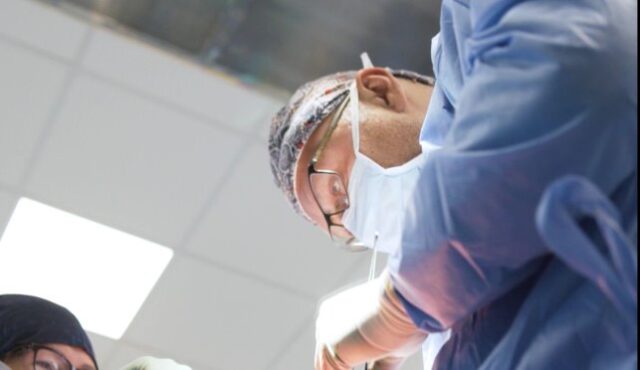The latest data from the NHS reveals that the waiting list figure is now the highest since records began in August 2007, with almost 360,000 patients who have been forced to endure year-long waits for their routine treatment, often while in serious pain.
The United Kingdom is currently dealing with an all-time record amount of patients awaiting routine surgeries, including those in need of general surgery. In accordance with the most recent information from the NHS (National Health Service of Great Britain), 447,877 people are waiting for routine surgeries, while 816,599 people are waiting for trauma and orthopedic treatments. Moreover, Nordclinic, a clinic in Lithuania that has been focusing on medical tourism for some time, is reporting a notable increase in inquiries from British citizens.
Risks of delayed surgery
Graham Browne, an active 68-year-old who underwent hernia surgery at Nordclinic in April 2023, shared his personal NHS experience: ,,I had been going through the NHS process for three long years. First of all, in the UK, I had to wait for a doctor’s appointment, followed by a series of physiotherapy consultations, which collectively took three months. Then, I had to pay privately for a scan that confirmed my hernia.” Following the confirmation of his health issue, G. Browne started researching several surgical possibilities while refusing private treatment because of its costs: “One option was to return to the NHS system and have the operation there, but I would still have to wait. I also went to a different UK clinice, but they claimed they couldn’t do the surgery since I had an inguinal hernia without a noticeable lump. The inference was that my issue turned out to be more complicated and would necessitate more time and money to resolve, as they were primarily geared to handle uncomplicated hernia cases.”
Linas Venclauskas, a leading surgeon at Nordclinic emphasized the critical nature of timely intervention for conditions like hernias and gallbladder issues: “Delaying surgery for a year and a half or more can lead to complications, reduced quality of life, and even emergency situations. One of the most concerning complications is hernia strangulation, which necessitates immediate surgical intervention. Frequently, the intestine becomes trapped, potentially compromising blood flow and requiring the removal of a portion of the intestine.” The surgeon also noted: “Prolonged waiting for surgery can lead to recurrent bouts of pain. In the case of gallbladder issues, there is a continuous inflammatory process, leading to the formation of stubborn inflammatory scars. This can make elective surgery more challenging and elevate the risk of post-operative complications.”
CASE STUDY: UK healthcare vs. medical treatment in Lithuania
The financial limitations that numerous UK citizens possess while obtaining medical care have been highlighted by Graham Browne: “The surgeon then quoted me £8000 for the surgery, which was beyond my means.” In such cases, a viable solution is provided. General surgeries, such as hernia or gallbladder procedures, may be partially covered by the patient’s health insurance, even when the surgery is performed abroad. “UK patients can utilize the S2 route and have a portion of the operation’s cost funded by the NHS,” revealed the clinic’s senior surgeon.
Fiona Rudd, who had her gallbladder removed through surgery, provides her insight into situation as she recounts her experience: “Facing the prospect of taking out a significant loan to cover private medical treatment in the UK due to the urgency of addressing my health issue or risk facing financial difficulties when my paid sick leave was about to end, I discovered that even when factoring in accommodation and flight expenses, opting for Lithuania was a far more economical choice compared to the UK.”
After her return to the UK, Fiona Rudd describes her experience in Lithuania: “My surgeon was undoubtedly world-class and provided constant reassurance throughout the process. The entire experience at Nordclinic, from start to finish, was seamless, underscoring that the entire process functions like a well-oiled machine.” Graham Browne, who was diagnosed with hip and hernia problems during the initial visit to Lithuania, elaborated on what F. Rudd indicated: “Upon returning to the UK, my wife and I thoroughly discussed the details and costs, which were a fraction of what private treatment in the UK would have cost. We decided to move forward, so just three weeks after my diagnosis, I returned alone. During the procedure, the surgeon identified and remedied a smaller hernia on the other side. I returned to my hotel room a few hours later and felt pain-free for the first time in years. I came back home three days later, and the clinic followed up with phone calls and emails to check details and guarantee my well-being.”




